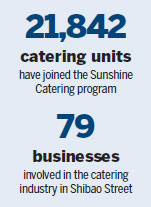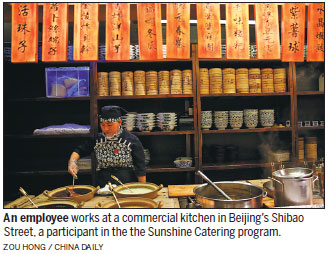New beefed up food safety is plat du jour
The Beijing municipal government is seeing real progress from the Sunshine Catering program - to improve the quality of the industry and make people more comfortable and satisfied with food safety and hygiene.
The State Council in April said China would improve the legal system on food safety issues and lift food safety standards to international levels.
The initiative provides food safety information to the general public about catering service providers, from such things as the processes behind their operations to even their credit evaluations.
By doing so, it aims to improve the transparency of food processing from providing raw materials to fine dining.

It also welcomes public supervision and helps promote the upgrade of the catering industry, said Duan Zhiyong, head of the food services supervision department at the Beijing Food and Drug Administration.
"In response to the State Council's call on improving food hygiene standards, we are committed to carrying out improving the quality of the catering industry, as part of efforts to build a food safety demonstration city," Duan said.
Duan added that success meant residents being able to eat better, more comfortably and more healthily.
The initiative aims to cover all the canteens of companies, institutions and construction sites by the end of 2019.
To date, a total of 21,842 food service units have joined the catering project, including canteens of primary and secondary schools and nurseries.
The move to toughen supervision on food safety focuses on improving the transparency in information, food processing, evaluation, management and punishment.
Participating service providers are required to publicize their food safety information, including food suppliers, and the health certificates of staff.
Experts say transparency in food processing can be achieved by using glass walls in kitchens, or large screens in restaurants that show what is going on during food preparation.
An online meal ordering portal in Beijing employs a smartphone application, so users can monitor the kitchens of hospitality service providers via live broadcasts.
Recently, the first batch of more than 1,500 catering companies appeared on the live broadcast platform.
Consumers are encouraged to comment about the catering service units, helping others to choose restaurants efficiently and law enforcement agencies to target problems.
The project is helping to improve the safety and quality of the catering sector, Duan said.
In addition, the initiative has beefed up punishment and will expose breaches of food and safety standards to the public, strengthening the supervision of catering services.
Duan said that the initiative had taken a problem-oriented and people-oriented approach, to build a comprehensive system involving companies, consumers, online ordering platforms, industry associations, third party evaluation institutions and the media for common progress and wider supervision.
Beijing's Shibao Street is among the first batch of demonstration streets participating in the catering project.
The garden-style pedestrian street is located in Haidian district and covers more than 20,000 square meters.
There are 79 catering businesses in the street, including popular brands and well-known chain restaurants, of which more than half are startups.
Yan Yunlong, deputy director of the food and drug administration of Haidian district, said that, some businesses in Shibao Street were supplied food from street vendors that could not meet hygiene standards.
With the help of the Beijing Glorious Oriental Group, the developer of the street and owner of catering sites there, these stalls were transformed into conventional shops in line with national health and safety standards.
That boosted overall sales and meant that the street's food culture could also be better preserved, Yan said.
Li Guijie, president of Beijing Glorious Oriental Group, said Shibao Street had responded positively to the measures.
All the catering units in the street have a business license. They are regularly inspected and receive training by the food and drug supervision departments.
Shibao Street encourages the catering companies to improve their food safety management, and strengthen quality and safety control, Li said.
For example, catering firms are required to buy food in line the regulations and qualified and licensed food suppliers must be registered. It is forbidden to use raw material from unknown sources.
Shibao Street will regularly shutdown catering outlets that ignore food safety management, or fail to implement changes, in a bid to ensure the quality of services in the street, Li said.
A manager of a barbecue restaurant in Shibao Street said his kitchen had been equipped with glass walls so customers could clearly see food preparations.
That ensured management of food and materials was more standardized and they could enhance the quality of food under supervision, he said.
Since December 2016, the daily flow of visitors to Shibao Street has reached nearly 50,000 people from around 10,000 in previous years.
Locals say the street has also become a successful incubator for many small and micro catering companies.
hanlu@chinadaily.com.cn

(China Daily 01/30/2018 page12)














